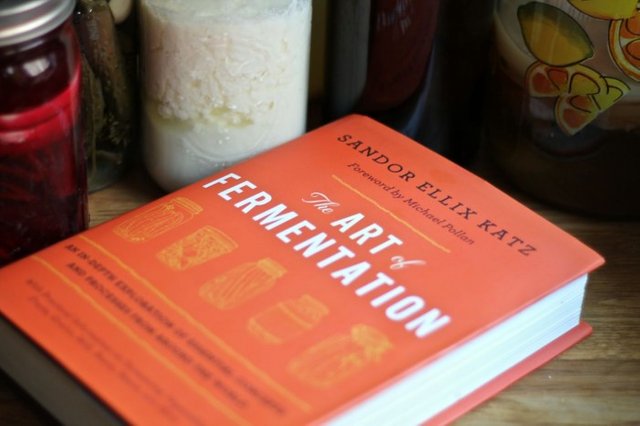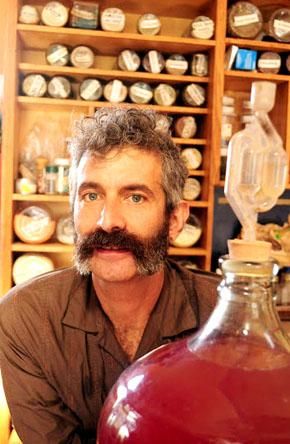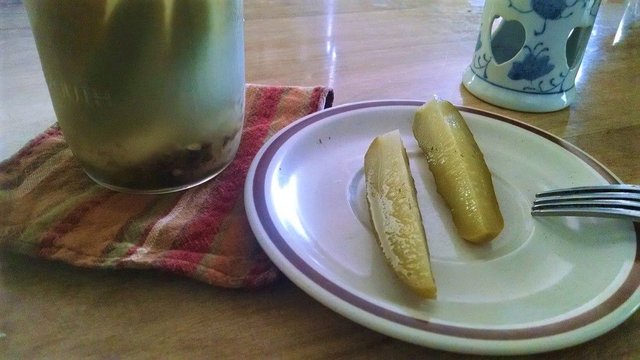Book Review: The Art of Fermentation, Sandor Katz

Image taken from http://phickle.com/the-art-of-fermentation-giveaway/
I love fermenting. I love learning about fermenting. My husband and I even write for a fermentation website! So, when it comes to finding good information on how to interact with this ancient, well-designed process, we're quite serious about finding resources that are worth our time. We have found that with fermentation’s recent surge in popularity, information on how to join the trend has never been more available. Beautifully formatted books fill the kitchen section at stores, recipe blogs fill Internet browsers, and hyper-saturated photos of Things In Mason Jars litter Pinterest boards. It seems that there has never been more information available on how to trendily convert vegetables into something buzz-wordily probiotic.
For the occasional fermenter, this huge sea of information may be enough. I have found, however, that most of it is a mile wide and an inch deep in terms of being thorough or educational. It’s highly likely that the rattled-off explanation of the processes of fermentation given on some blogs or in the introductions of many books may start looking familiar--perhaps even copy-pasted. If you truly desire to understand fermenting--not just engage in a mysteriously-guided recipe that results in yet more pickles--is there a better source?
Enter The Art of Fermentation ( http://amzn.to/2AwO1Bp ). This is a large, thorough book, not for the faint of heart (is anything in the fermenting world for the faint of heart?), but it is the only one I recommend to those who want to truly learn about how and why to ferment. The author, Sandor Katz, is a unique, driven individual who does not just write about fermentation, he lives it. A self-described “fermentation revivalist,” he has made it part of his life mission to educate, demystify, and empower others to take back their health, food, and to make fermentation more than just something that describes the occasional condiment.

Sandor Ellix Katz. (photo by Sean Minteh), image taken from https://hudsonvalleyone.com/2014/11/28/gardiner-library-hosts-a-presentation-by-sandor-katz-author-of-the-art-of-fermentation/
Not quite a recipe book, not quite a textbook, and not quite a travelogue, Katz’s book straddles the lines of all three, tracing fermentation through its myriad uses and forms throughout time and throughout the world. Pickles and sauerkraut are merely two stops in a huge tour of fermented possibilities that include everything from familiar classics like tofu and cheese, to kombucha and tempeh, to ones you may have never known existed like Hawaiian poi (fermented taro root), merissa (Sudanese Toasted Sorghum Beer), smreka (Bosnian Juniper-based drink), and tipliaqtaaq quaq (Native Alaskan fermented fish). Realizing the sheer scope and breadth of fermentation in human culture and how odd it is to have it absent from modern American diets is certainly enough to give one pause!
I have found this book to be immensely useful because it explains the processes for making each food in detail, and doesn’t just provide recipes alone. It more explains the process of creating the food and invites you to experiment, make mistakes, and be encouraged through success. As the intrepid fermenter may soon find, working with wild yeast and transforming food alongside it is more relationship than formula. Seek to harness it like a mere algorithm, and you will soon find yourself surprised by something unexpected.
Katz is fearless, and his boldness in dealing with food in various foamy, bubbly, and effervescent forms is inspiring. Every section of the book provides the reader with ideas, methods, wonderfully thorough troubleshooting, and personal anecdotes about his huge array of experiences with making the food described. In addition to discussing fermentation as a source of nutrition and healing, it also explores uses of fermentation beyond the kitchen. Bioremediation, alternative clothing design, energy production…who knew that humble little yeast and bacteria had so many abilities? Finally, the resource section at the back of the book is truly indispensable. Since this book was recently published in 2012, you can expect all the references to still be currently relevant.
In my recent exploits of harvesting and converting the huge amount of acorns on our land into edible flour (my first batch is drying by the woodstove as we speak!!) I have been reading a lot about what to do with my finished product. Wouldn't you know that there's even a section on fermented foraged acorns?? I'm serious--this book is my one-stop shop when it comes to fermenting.
Read it straight through or open it at random to take in an inspiring chapter or two, I guarantee that The Art of Fermentation will leave you hungry to try something new. Just be warned! You may find that your kitchen will never quite look (or smell!) the same again.

One of this summer's batches of lacto-fermented pickles!
Do you ferment for your daily meals? What's your favorite thing you've made?
By the way, here's the Fermentation Blog we contribute to: http://www.fermentools.com/blog
Other places to find Simple Life Homestead Online!
Blog: http://www.simplelifehomestead.com/
YouTube: https://www.youtube.com/channel/UCwDzB6sjt8sZfB9hVUojxrQ
Facebook: https://www.facebook.com/SimpleLifeHomestead/
Twitter: @SLHomestead
I've had this on my list of books to order. Now, I see it's a must have for me. Thanks for nudging me. Placing the order tonight, along with a few others I've been putting off.
Haha, happy to be of service! Ooh, now I'm curious what other books you're getting. Any other good homesteading ones?
I've been putting this one off because it is pricey, but I'm just gonna do it. The Practitioner's Encyclopedia of Flower Remedies: The Definitive Guide to All Flower Essences, their Making and Uses, by Harvey, Clare G.
Real Goods Solar Living Sourcebook: Your Complete Guide to Living beyond the Grid with Renewable Energy Technologies and Sustainable Living, by John Schaeffer
The Grafter's Handbook, 6th Edition, by R.J. Garner
Integrated Forest Gardening: The Complete Guide to Polycultures and Plant Guilds in Permaculture Systems, by Weiseman, Halsey, and Ruddock
The only thing we have fermented is kefir water and we just started that here in Panama. I'm interested in doing a few other things, but haven't given them a try yet. Looks like a book that has a lot of useful information! Thanks for the review!
Ooh, I bet you'll have great success with the warm climate in Panama--your ferments will probably go twice as fast! Are there any traditional Panamanian ferments? I must admit, I don't have very much knowledge of the country, but I'm always up to learn! Thanks for your comment!
I honestly don't know of any traditional ferments. It isn't something I've looked into. Yeah, I hear that everything goes a lot quicker here. We did Kombucha for a little while but we don't like the taste as much as kefir. We live in the highlands, so the warmest it gets most days is mid 70s.
Very cool! I'll have to see if thriftbooks has it!
I hope you can! It's one of those books that's worth owning, rather than just borrowing.
If you're interested in the topics, you might also want keep an eye out for David Asher's The Art of Natural Cheesemaking, or Melissa Richardson and Caleb Warnock's The Art of Baking With Natural Yeast. I have learned SO MUCH from these people and their fearless food making! If I can't travel back in time to meet the people who actually knew how to do these processes right (and ...I can't), I can at least sit down with the people who have made it their lives mission to rediscover that knowledge. :)
The cheese book is also on my list! I haven't done any fermenting yet but I tried sourdough. It was hit or miss. Kept growing mold :(
It's such a crazy learning curve. When I first started, I was SUPER WARY, like any wrong move I made was going to immediately give birth to a Botulism beast that would kill my family in their sleep. But now, I feel like I understand the process so much better...and it works! I truly love working with my sourdough, so if ever you feel like swinging back in the saddle and want someone to bounce ideas off of, I'd love to help if I can! Sometimes a starter is just a real stinker. I've restarted mine countless times by this point, and each one is slightly different.
Yes I was thinking once the weather cools down where we are I might try again. I have an oven project to complete before I can bake anything but once that's done I definitely want to try. Sometimes it went fine and other times not so much
I am a newbie to fermented foods, but now that I have started I will just have to plunge on ahead. This is one book I will have to look for. Thanks for the information.
It's a crazy journey, that's for sure. So many articles online are full of fear and worry about how it will go wrong but for thousands of years, people have been using this process to live. I liked this book because it fully did away with the fearmongering. Happy experimenting!
Thank you!
I read the book a few years ago and started my journey of fermenting drink and food, which has become part of my diet every single day. I do see my overall health has improved!
Thanks for your comment! And I don't doubt it! My husband and I see this process as a gift we were given to have better health. What do you ferment?
It's truly a gift! I ferment Kombucha tea, Keifer water, green papaya from my garden all the time. And seasonal cabbage, cucumber, etc.
Love that book!
It's a good one! It's one of those books that's worth owning, not just borrowing. :)
I like Wild fermentation by the same guy too
I haven't yet read that one, but I don't doubt that it's awesome as well!
Its the first one he wrote befoteThe Art of Fermentation. They hsve a lot ofthe same info but its a much easier read